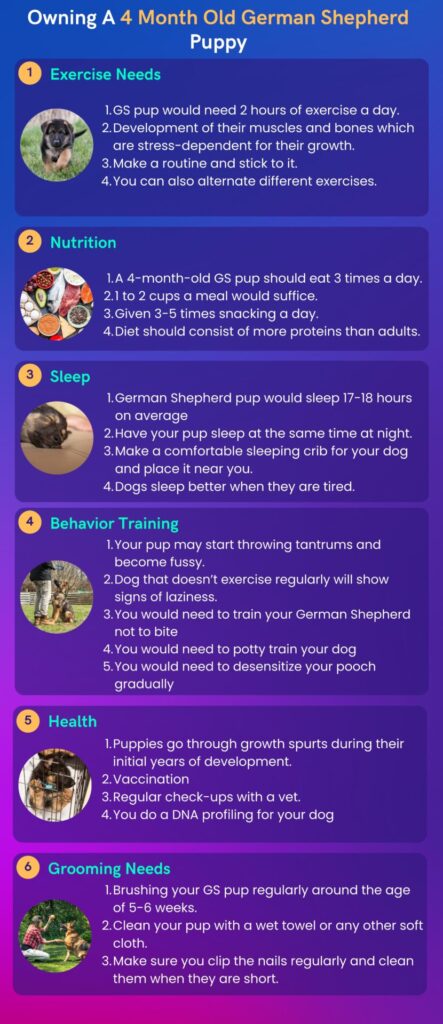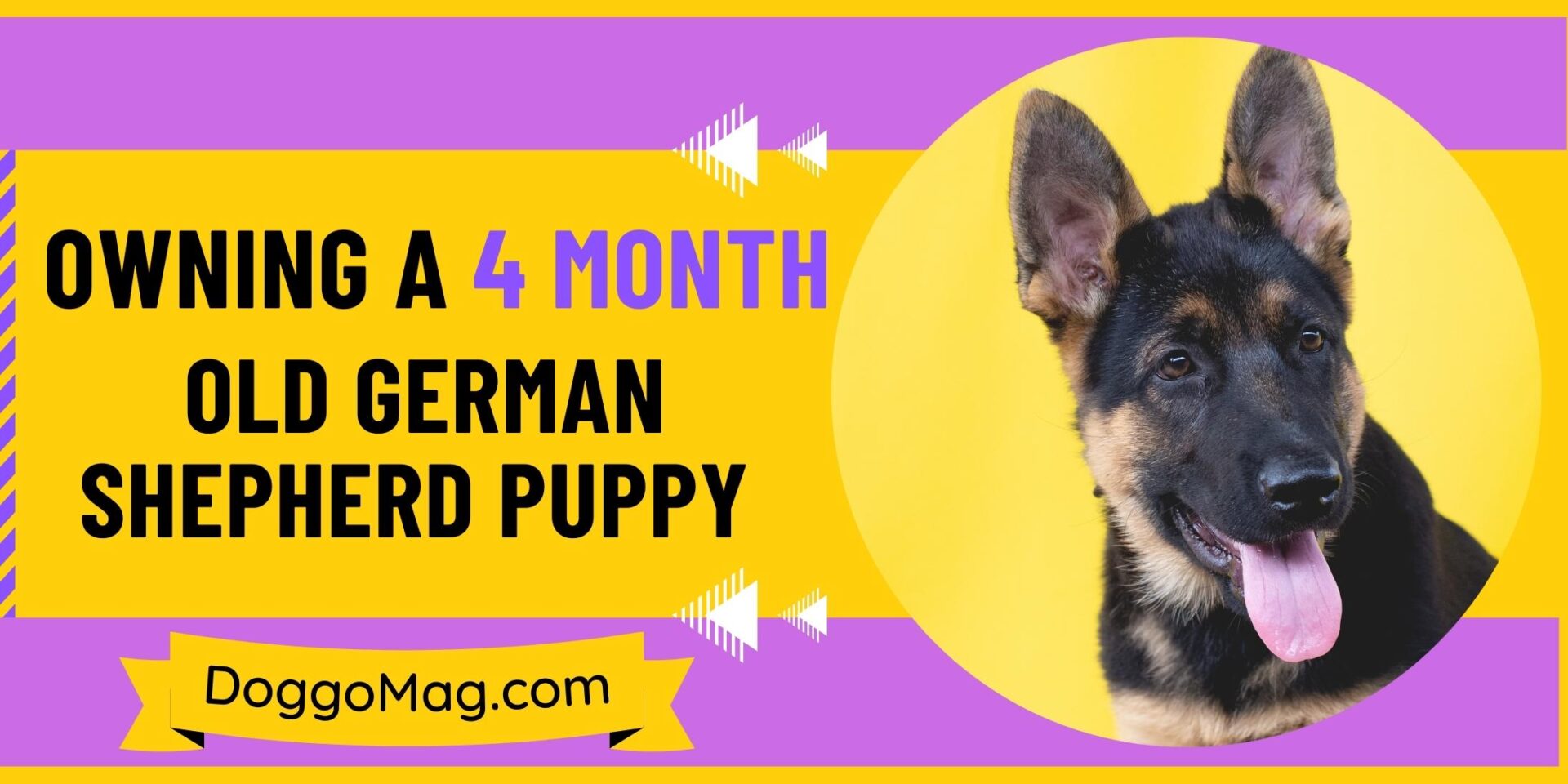Owning A 4 Month Old German Shepherd Puppy 101
Last Updated/Info Checked on October 20, 2023 by Scott
German Shepherds can be easily regarded as one of the most famous dog breeds around the globe.
Their highly trainable personalities, intelligence, and exceptional devotion to their families make them excellent choices both for companionship and as working dogs.
On average, GSDs tend to have a lifespan of 9-13 years and GSD’s puppyhood will last for about 2 years. This may vary between sexes as males tend to reach adulthood later.
As versatile and intelligent as they are, young German Shepherds may not be an easy breed to handle.
A 4 month old German Shepherd puppy has particular demands in training, nutrition, grooming, and health that need to be met for them to grow into a healthy and capable adult.
Related: Are German Shepherds good for first-time owners?
A Complete Guide On A 4 Month Old German Shepherd Puppy Behavior And More
In this article, we will be going into the details of raising a 4-month-old GS pup. From its behavior training and grooming to its specific health demands with nutrition and exercise.
If you have a 4-month GSD and need to know how to rear it, then don’t worry because we’ve got you covered.

Also Read: 2 month old German Shepherd puppy
1. Exercise Needs
Not every dog gets a 5/5 star rating on Dogtime for energy and exercise needs and when one does so, you know it’s full of beans.
A. How much to walk?
Even during their puppy days, a GSD will require a lot of exercise. You would need to take it out for walks multiple times a day, that you’d know from its mood, however, the length of one walk should be about a mile.
Generally, a GS pup would need 2 hours of exercise a day. You may change these hours on different days depending on the mood and weather but on most days it should remain the same.
B. Importance of exercise
This is important for the development of their muscles and bones which are stress-dependent for their growth.
C. Have a routine
Make a routine and stick to it. A GSD pup that exercises regularly would have a stronger build and will tolerate the external environment more than one that is too pampered at home.
D. Alternate between exercises
You can also alternate different exercises. Instead of walks, you may choose to play fetch or have an obstacle course. You can also let your pooch engage in group sports with other dogs under your supervision.
This would keep your pooch’s interest intact in physical activities and it will never get bored.
2. Nutrition
Where exercise is important for the physical development of a dog, nutrition helps it grow mentally. Also, good exercise is aided by good nutrition that allows the body to grow in size.
A. How many times a day?
A 4-month-old GS pup should eat 3 times a day. These meals should be placed at regular intervals and should follow a definite menu.
As a dog grows, these meals may become less frequent and 2 meals a day would be sufficient.
B. How much to feed a German Shepherd puppy per meal?
1 to 2 cups a meal would suffice. You will also need to adjust this based on your dog’s appetite and general recommendations.
C. General diet contents
The diet should consist of more proteins than adults and it should be recommended by a dog nutritionist.
Growing pups need more proteins and essential nutrients than adults as their dynamic bodies are in demand of these foods.
D. Snacking – Best time to feed your GSD puppy
In between the meals, you can surprise your pooch with snacks. These could be given 3-5 times a day and your dog’s mood would guide you through it. Make three meals compulsory with snacks in between – Morning, noon, and night with the intervals in between.
However, never overfeed your dog as it can lead to indigestion in the short term. Over the long run, it may lead to obesity and deteriorate cardiovascular and joint health. This can deduct potential years of healthy life from your dog’s lifespan.
3. Sleep – Do German Shepherds sleep a lot?
Sleep plays a crucial role in the development of a pooch’s brain as most of the neural connections are formed during sleep at this age.
Also, the hormones required for the growth of the dog’s body are mostly secreted when the body is asleep.
As a pup grows, its sleeping pattern goes through changes until it becomes that of an adult. This means the total sleeping hours for a GSD puppy would vary across different months as it grows.
A. 4-month-old GS pup’s sleeping hours
At this age, a German Shepherd pup would sleep 17-18 hours on average.
This sleep would be divided into multiple naps and you should be quick enough to utilize the intermittent hours of wakefulness for feeding and exercise. This would not disrupt the pup’s sleep routine.
B. Make a sleeping schedule
Have your pup sleep at the same time at night. Most pups have long stretches of sleep at night while napping during the daytime. A regular sleeping schedule allows for better and undisrupted sleep.
The naps, however, might be random and less predictable during the day.
C. Allow for a comfortable sleep
Make a comfortable sleeping crib for your dog and place it near you. This will allow you to keep an eye on the dog during unconscious hours. Also, the dog will get used to your scent which would strengthen your bond with the dog.
During the waking hours, take your dog out so that it can relieve itself and get a sleep that is undisturbed by nature’s call.
D. Tire out the dog during the day
Dogs sleep better when they are tired. Exercise during the day will tire them out and help them sleep better.
4. Behavior Training
Before the puppy adopts the more constant temperament of an adult dog, it would show many phases of different behaviors throughout its puppyhood.
A. Tantrums
Your pup may start throwing tantrums and become fussy. This could be due to a lack of sleep or the mere fact that it is hungry.
At times your pup will be upset by your certain behaviors and will start misbehaving.
You need to find the reasons behind your dog’s tantrums and correct them rather than stop it from showing discontentment.
B. Laziness
At times, for the same reasons of lack of sleep and feeling hungry, a pup may be overly lazy. Also, a dog that doesn’t exercise regularly will show signs of laziness.
As with tantrums, try to know the reason and fix it rather than forcing your dog to be active.
C. Biting
Dogs have an innate habit of biting and during their pup years when they haven’t been trained to control this behavior, they tend to bite their owners, other people, and pets.
You would need to train your German Shepherd not to bite through positive reinforcement where you associate the accepted behavior with rewards like food treats and the unwanted behavior is made to abolish through commands.
That ingrains the positive attitude into the dog’s mind.
Also, you can divert your dog’s attention to chewing toys when the biting habit sticks around for a long time.
D. Pooping around
Puppies that are not potty trained tend to get involved in potty accidents around the house.
During this age of around 4 months, you would need to potty train your dog and supervise it most of the time, otherwise, accidents are bound to happen.
Here, positive reinforcement would again play a key role, reward your dog each time it defecates in the desired place and this behavior would stick with the dog, hopefully forever.
E. Barking
Pups that are not exposed to environmental stimuli are overly sensitive and would bark when exposed. This includes strange noises, sights, and people.
You would need to desensitize your pooch gradually so that it gets accustomed to external stimuli.
Related: Do German Shepherds bark a lot?
Watch how a 16-month-old female pup demonstrates obedience:
5. Health
Taking care of your pup’s health is of utmost importance as any disease or a halt in growth can be debilitating.
A. Growth monitoring
Puppies go through growth spurts during their initial years of development. Making sure they are reaching their growth milestones is crucial for their health.
Have a GS puppy growth chart and assess your puppy’s growth on it. This helps in understanding when medical intervention would be needed.
B. Vaccination
By this time your dog should have completed 3 rounds of DHPP vaccination.
Vaccination is very crucial in protecting your dog from many preventable diseases that you may also contract.
C. Regular check-ups
It is important to have your pup take regular visits to the vet. Many diseases that are picked on routine visits can be easily missed at home.
D. Inherited disease profiling
Some dogs suffer from inherited diseases that may not be apparent at birth and can come later on.
You do a DNA profiling for your dog when you suspect such a lineage. This would be however expensive and may not be covered by your dog insurance.
6. Grooming
German Shepherds are one of the most easily groomed dog breeds owing to their minimal maintenance and their ability to learn self-care. But that said, you would still need to take care of certain aspects of their grooming.
A. Brushing
You should start brushing your GS pup regularly around the age of 5-6 weeks. Keep in mind that the dog’s coat at this age is more soft and fluffy and overuse and excessive force of brush can damage their fur.
You need to be gentle in brushing the pup and do it regularly.
Related: Can you shave a German Shepherd?
B. Bathing
Till the age of 3 months, clean your pup with a wet towel or any other soft cloth.
Your pooch’s body is not ready to withstand immersion in water until 3 months. After that, you should start bathing it.
Use a shampoo that is organic in nature and non-irritant, be careful around the eyes, and dry the dog properly before letting it out in the open.
Also, you would need to clean the dog’s ears during the bath.
C. Nail Clipping
Overly grown nails can trap dirt and bacteria. These can easily get spread to everywhere the pup goes and everyone it meets.
Make sure you clip the nails regularly and clean them when they are short. You can ideally leave a 2-3 mm length off when cutting them.
Frequently Asked Questions
Let’s look at some of the important questions regarding 4 month old GSD pup growth.
How much should my 4 month old German Shepherd puppy weigh?
At the age of 4 months, your pup should weigh between 28 to 39 pounds. You should have a growth chart for your dog and keep assessing the month-wise milestones. This way it becomes easier to detect any growth abnormalities that may require medical intervention.
At what age do German Shepherd’s ears stand up?
A German Shepherd is born with its ears facing down. It is not until 4-5 months that they become erect. Some pups may have their ears erect earlier. During stressful situations, a German Shepherd would also lower its ears and that should be remembered.
A Complete Guide On A 4-Month-Old German Shepherd Puppy – Conclusion

All dogs have different needs in various stages of their development, the needs of a pup are different from those of an adult. This needs to be remembered when dealing with puppies as they are more sensitive to any neglect in care.
4-month German Shepherd pups are considerably immature and come with a lot of troubles. This includes tantrums, laziness, and biting habits.
They are exposed to constant threats of malnourishment and infections. Moreover, their sleeping cycles are very crucial yet delicate. All these features make them susceptible to irregularities and diseases.
You would need a proper routine to take care of their exercise and sleeping needs. Their meals need to be regular 3 times a day and follow their dietary requirements. Furthermore, you need to understand their age-appropriate grooming needs and fulfill them.
Finally, utmost care needs to be taken for their health. Ensure their timely vaccination and regular checkups. Any inherited illness needs to be identified early on and dealt with before its clinical manifestation.





![10 Most Dangerous Dog Breeds in the World [2024 List]](https://doggomag.com/wp-content/uploads/2022/12/List-of-Most-Dangerous-Dog-Breeds-in-the-World-768x432.jpg)

